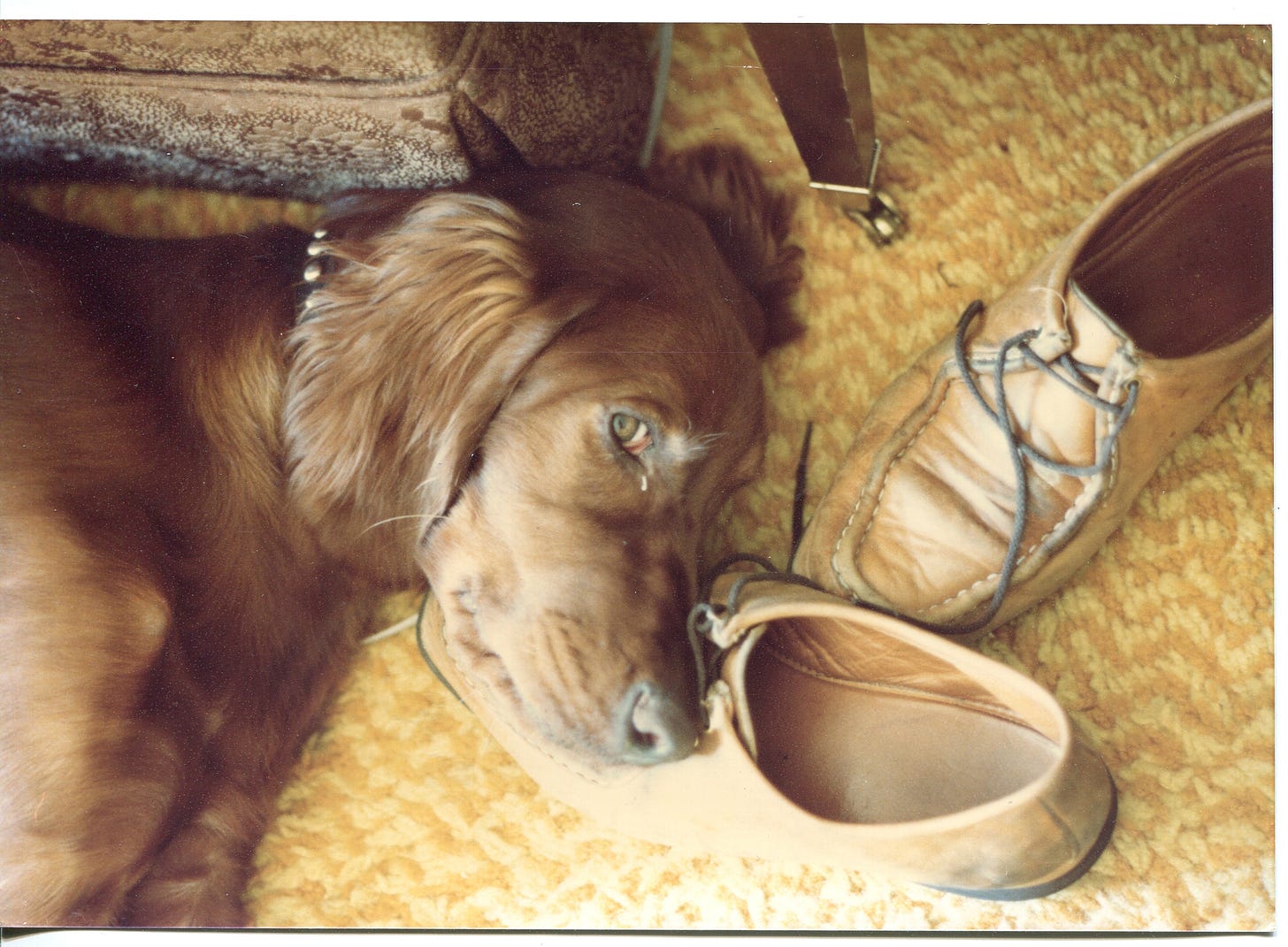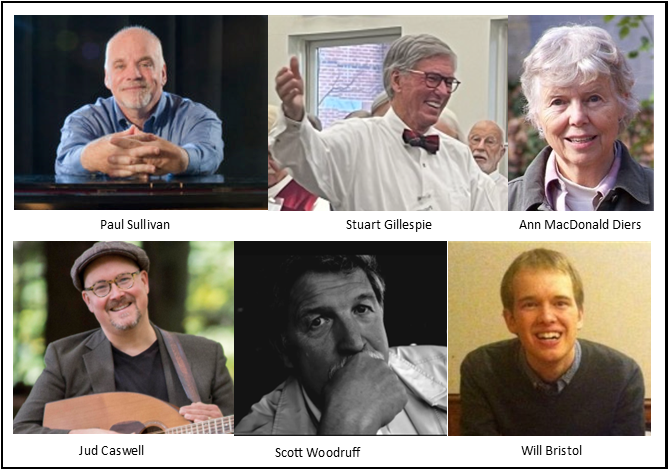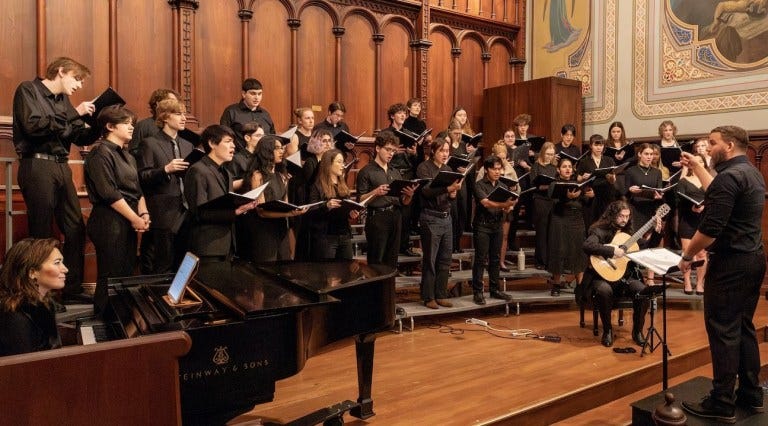“Something I love to do when I encounter someone walking with their dog is to pick out something I sincerely like about their dog (their eyes, ears, a mustache, funny markings, a curly tail, just something that’s sweet about that particular dog) and tell the person. It usually goes something like this, Me: “I love his ears, oh my gawd aren’t they amazing” and without missing a beat, people who do not even know me will immediately respond “I knooooow, aren’t they just the best.” There are things that break our hearts, but there are so many things that also lift our hearts and remind us to connect, to appreciate and “be” with one another in ways that are still delightful and oh so generous.” — Carrie Newcomer
In my case, the thing about dogs that usually tugs at my heartstrings is the way their two eyebrows can move independently of each other. Have you ever noticed that? It makes me laugh every time I see it. If I meet you and your dog when I am out for a walk, I will undoubtedly mention the eyebrows along with whatever else I find sweet about your furry friend. The eyebrows just slay me.
But that’s not the point of this blog post. Connection is the point. Connection, so elusive in this world of ours. So critical in this world of ours. “There are so many things that . . . remind us to connect, to appreciate, and ‘be’ with one another in ways that are still delightful and oh so generous,” as Carrie Newcomer says.
There are those times when reaching out to strangers, even to make eye contact, may feel distinctly unsafe, and so we plod along, eyes riveted to the ground. At least that is true for me. But I suspect I am safe more often than I think I am. At any rate, dog walking conversations are usually safe territory. People usually love for you to praise their dogs. “Beautiful dog,” I say. Or: “Oh, what a happy dog!” (this, regarding a dog that is wagging his tail and straining at his leash to come say hello to me).
One of my neighbors laughingly asserts that I know the names of all the dogs in our neighborhood. She is not 100% correct, but she is close. I usually know the dog’s name, but not always the name of the person walking the dog. We’ll be driving down the street, and my husband will say, “There’s Peaches.” And, yes, there’s Peaches. But who is walking Peaches? Is it Bob or Bill? Maybe Jack? I think he once told me his name, but I forget.
Other conversations are easy to start. “Beautiful scarf,” I say to the woman ringing up my groceries. Or: “What an array!” I exclaim to the people at the farm stand. Or: “Aren’t you a sight for sore eyes?” I ask the little girl who comes to my door selling Girl Scout cookies. “Have you sold a lot of cookies yet?” And she solemnly shows me her list of sales (consisting mostly of mint cookies, I notice).
All of those conversations establish connection. But some conversations are a little harder, especially the ones where you are asking for help. Maybe those are the conversations that have the most to teach us.
A couple of weeks ago I was a presenter in a community program celebrating poetry in general and Henry Wadsworth Longfellow in particular. Before you say, “That sounds boring,” let me take a little detour to disabuse you of that notion.
Longfellow lived in my town, Brunswick, Maine, first when he went to Bowdoin College here in the 1820s, and later when he taught at Bowdoin for a few years before heading south to Cambridge, Massachusetts, and Harvard University. He was the first professor of modern languages. As such, there were no textbooks for his subject matter, so he had to create his own. Back in the day, he was a member of the church I served here (many, many years later, I hasten to add). One of that church’s prized possessions is a signed pulpit Bible Longfellow gifted them. (When our church burned in the middle of the night in 2011, the Longfellow Bible is the only thing I asked the fire department to rescue from the building.) Because of that congregation’s abiding connection to the revered poet, I learned more about Longfellow than I ever imagined I might.
Over 20 years ago, some of the town’s citizens dreamed up “Longfellow Days,” an annual, month-long celebration of poetry to help us get through February, Longfellow’s birth month. Winters can drag on here in Maine, and, for many people, February is the toughest month. As some people say, “January is so long in Maine that is extends all the way into February.”
Well, our town’s February Longfellow Days poetry celebration has grown and grown over the years, involving some of Longfellow’s poetry, yes, but featuring contemporary poets reading their own works, films, music, historical speakers, visits to museums and blacksmith shops, open mics, and more. This year we were celebrating Bowdoin College’s class of 1825, which included not only Henry Wadsworth Longfellow but also Nathaniel Hawthorn.
The event at which I was to speak was an extravaganza held at Bowdoin College, featuring choral and solo pieces of Longfellow poems set to music by local composers. There was a choir combining choruses of colleges students, community and church choirs, and a senior citizens chorus. There were people to recite and, in some cases, explicate several Longfellow poems (that would be me). There were pianists, and guitarists. There was Taylor Mali, a professional spoken word poet and Bowdoin College graduate, reciting a poem written expressly for the occasion. It was a true community event, held in the college music auditorium, which was packed with a high-energy, excited, enthusiastic audience.
So, don’t tell me poetry is boring. I beg to differ.
Anyway, to get there that night, I had to help my husband into the car. Because it had snowed a bit that day, I had a hard time navigating him in his wheelchair from the front door of our house to the car door. Then, I discovered the hatch to the car was frozen shut, which meant I couldn’t load the wheelchair in back, the way I normally do. So, I tried to load the wheelchair into the back seat, only to discover the ground was so icy by the rear car door that I couldn’t pick up the wheelchair without slipping and falling. So, then I moved the wheelchair to the foot of the driveway, which was less icy, backed the car down there, and tried again. And, of course, the wheelchair wouldn’t fit easily through the car door. There I was, struggling and struggling and STRUGGLING, moving the heavy wheelchair this way and that, until finally I managed to tilt it at just the right angle to cram it into the back seat.
And we were off.
But, of course, even though we had left our front door exceedingly early, we were setting out from our driveway much later than we had planned because of all the delays. By the time we got to the concert hall, all the handicapped parking spaces were taken. So, I pulled the car over to a spot next to a ramp I could use to easily wheel the chair into the building. Then I started the whole recalcitrant wheelchair struggle in reverse. Pry, pry, pry the chair out of the car. (Of course it didn’t want to come free.) Set it all up. Help husband settle himself.
Time was ticking by, and I was getting frantic. I knew that if I wheeled my husband into the building and then returned to my car to find a spot somewhere in Timbuktu, I would be late, late, late.
But, looking up, I spied a group of people heading toward the hall. “Are you going to Studzinski Hall?” I called out as they approached. They were. “Would you please take my husband in? I need to park my car.” They were happy to help, of course. And, by the time I got the car sorted and joined my husband in the lobby, there was a lovely usher ready to help my husband and me navigate the accessibility system so that we could easily reach the spot where I was to meet with the other presenters.
Meanwhile, somewhere else on the same campus, the event’s main organizer was enduring her own challenges. She had ordered a giant cake to serve after the concert. But, she couldn’t park right next to the building, and giant cakes are heavy. As she staggered under the weight of her heavy load, she spotted some young students walking across the campus. “Would you help me, please?” she called out. “I’m a little old lady trying to carry a giant cake. It’s too heavy for me.” Even though they were on their way to catch a bus (something with a firm deadline) they came to help her. Of course they did.
Have you ever noticed that some people are quick to offer help but ever so uncomfortable about asking for it or accepting it? Have you ever noticed that about yourself? Sometimes I think I have been one of those people during most of my life — quick to step in, eager to smooth the way for others. But, oh, so loath to admit I might need just a wee bit of assistance now and then. But these days necessity is teaching me something new: That seeking help when I need it gives people an opportunity to give of themselves. People like to help. And that is one important way of creating connections.
At the end of that magical evening of poetry and music, the Longfellow Days organizer addressed the crowd to thank the performers, sponsors, and everyone who attended. ‘And you know the best thing?’ she added (I am paraphrasing). ‘The best thing is that we are all here, together, instead of home in front of our screens. We really need to be together, in community with each other. We really, really need that. And here we are.’
Which leads me back to encountering someone walking with their dog. Or asking for help. Or offering help to someone who seems to need it (even if it means you might have to run to catch the bus).
Reach out. We are in this together, folks. No matter whom we voted for. No matter what religion we are or aren’t. No matter if we eat steak or are vegans. No matter if we spray pesticides all over our yards or compost and use only everything organic. We are in this together.
How best to cross the chasms that appear so wide than to notice how happily someone’s dog’s tail wags, or the heavy load someone carries, or how much someone needs a little assistance to get up a handicapped ramp? How best to cross a chasm than to smile and just say hello? Maybe not always. Not all days feel that way. Not all people seem that safe. But maybe today does. Maybe the next person does. Maybe this time a little bridge might appear out of nowhere. As Carrie Newcomer reminds us, “There are things that break our hearts, but there are so many things that also lift our hearts and remind us to connect, to appreciate and ‘be’ with one another in ways that are still delightful and oh so generous.”
Love,
Sylvia
P.S. See below for publicity of the program that night. It was all pretty amazing!
Saturday, February 22, 7:30 pm ~
TRIBUTE TO CLASS OF 1825: EVENING OF MUSIC & POETRY
Studzinski Hall at Bowdoin College
Longfellow’s poetry set to music and voice, featuring compositions by Paul Sullivan, Stuart Gillespie, Ann MacDonald Diers, Jud Caswell, and Scott Woodruff. Performed by the combined Bowdoin Chamber Choir with chorus members from area community choirs. Directed by Stuart Gillespie and Will Bristol. In addition, spoken word poet, Taylor Mali will perform in tribute to the Class of 1825! And Brunswick community members will participate in readings of the poems orchestrated.
Paul Sullivan is an American Grammy Award winning pianist and composer whose music blends jazz and classical styles. He is a member of the Paul Winter Consort and has performed with some legendary orchestras, such as the Philadelphia Orchestra and the Boston Pops. Sullivan has worked in some of New York’s most prestigious jazz clubs as well. In the theater world, he has worked as a Musical Director, pianist, and/or conductor for many Off-Broadway and Broadway shows.
Ann MacDonald Diers (1925-2019) received a BA from the Hartt School of Music and an MA from Columbia University. Composing music was one of her driving passions, whether for chorus, children or as a soloist. Several of her pieces have been published and her anthem “Hold Your Hands Out Over the Earth” won first place in a national competition.
Stuart Gillespie retired in 2004 as Director of Choral Ensembles and Fine Arts Department Chair at Naugatuck Valley Community College in Connecticut. He began his choral directing career in 1965 as a baritone with the US Army Chorus in Europe. He is a published composer and has written many choral arrangements for the MSC Singers.
One of the leading singer-songwriters on the current scene, Jud Caswell is a master multi-instrumentalist, playing guitar, banjo, cittern, whistles and Irish drums. Jud’s originals have won some of the most prestigious songwriting contests in the country, including the legendary Kerrville New Folk competition. His songs have been taught at Berklee, recorded by Judy Collins, and named “#4 Song of the Decade” by New York’s WFUV.
Scott Woodruff is a talented Midcoast Maine musician, sound engineer, and host of open mics. He enjoys mixing it up as a solo artist and band member with such bands as Leopard Girls. He has produced a CD, Them Old Bones, which is a collection of his songs written about his life experiences.
Bowdoin’s Chamber Choir is a vocal ensemble which delves into a wide variety of music from different genres and time periods. Singers in Chamber Choir work on developing healthy singing practices within the context of ensemble singing. The ensemble aims to be a place for singing together joyfully while also stretching themselves as musicians and artists.
Taylor Mali, 1987 graduate of Bowdoin College, is an accomplished slam poet, humorist, author and educator. He is one of the original poets to appear on the HBO series “Def Poetry Jam.” A four-time National Poetry Slam champion, he is the author of four collections of poetry and a chapbook, The Whetting Stone, which won the 2017 Rattle Chapbook Prize. Taylor is also the author of the acclaimed nonfiction book, What Teachers Make: In Praise of the Greatest Job in the World. For more information about Taylor, see his bio on the Blue Flower Arts website.







“Been there, done that” with my husband’s chair walker! I CAN DO THIS!!! I stubbornly say to myself. Until someone seeing my plight will off assistance + I sigh w relief. People will be more than happy to assist if you only ask. Because of my short stature I often ask for assistance at the grocery store for items on the top shelf. People will immediately smile + are happy to do more if needed. Only need to ask!!
P.S. I also loved being part of that Longfellow Days evening of poetry and music! It was joyful and rewarding. Thanks for sharing The Galaxy, a complicated piece of poetry and a complex song to sing. So satisfying!